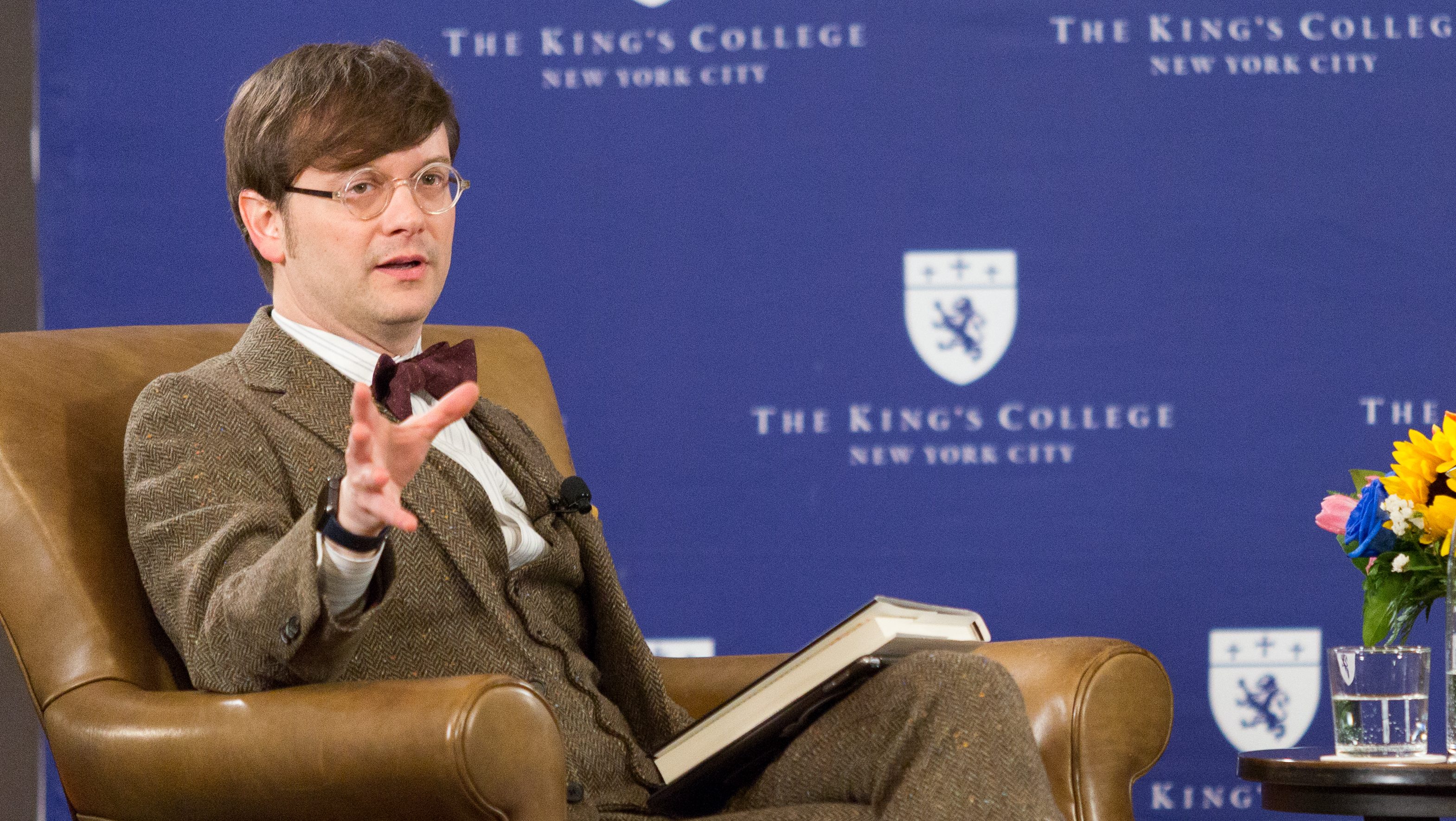Larry Norman, the Pied Piper of the Jesus Movement
On March 20, Eric Metaxas interviewed Chancellor Gregory Alan Thornbury on his new Larry Norman biography.

On March 20 in the City Room, New York Times bestselling author Eric Metaxas interviewed Chancellor Gregory Alan Thornbury on his new biography, Why Should the Devil Have All the Good Music?: Larry Norman and the Perils of Christian Rock (Convergent, 2018). Thornbury’s book draws upon intimate access to Norman’s personal archives to detail the life of the “father of Christian rock.”
Larry’s brother Charles, sister Kristy, lifelong friend Kristin Blix (Charles’s wife), as well as friends Jason Carter and Silver Sorensen were present in the audience. The event was presented by Metaxas’s lecture and forum series, Socrates in the City, and was live-streamed on Facebook.
WATCH: The March 20th Event
“Larry Norman was a pioneer,” Thornbury said in the conversation with Metaxas. “He was doing something that was very difficult to do and that neither the church, nor the secular rock ’n’ roll music industry that he was part of, wanted him to do.”
Norman got his start in the musical mainstream, signing to Capitol Records at age 19. He played on bills alongside Janis Joplin, Jimi Hendrix, and The Doors and rubbed shoulders with Neil Young and Skip Spence (of Moby Grape). Billboard magazine called him “the most important songwriter since Paul Simon.” Norman offended his traditional parents—his father is said to have yelled, “No son of mine is going to grow up to be Elvis Presley”—and he frustrated the establishment church by talking to “drug pushers and prostitutes, people the church would have nothing to do with,” said Thornbury.
Yet he was never fully at home in the secular entertainment world either. He was fired from the band People! when his bandmates, newly converted to Scientology, wanted nothing to do with the Christian references in his lyrics. Once he began singing on his own, he would deflect applause at concerts by raising his index finger to heaven until audiences stopped clapping. Thornbury said, “He wasn’t there to entertain at all. He felt that was contrary to the purpose. He wanted your brain to turn on so that the Holy Spirit could work.” Paul McCartney reportedly once told Norman, “I really love your music, but you’ve got to shut up about Jesus. You could be a big star if you stopped talking about religion.”
During the interview, Metaxas probed Thornbury’s impetus for writing Why Should the Devil Have All the Good Music? Thornbury first heard of Norman when he was working at a small campus radio station in college. “At what point do you say, ‘I’m writing a book about you’?” Metaxas asked.
Fuller Seminary had been planning an exhibition about the origins of the Jesus movement, and asked Norman’s younger brother Charles if he could provide some of Norman’s personal effects for the display. They also asked Charles to recommend a scholar to deliver a talk on Larry Norman. “I think the only evangelical scholar I know is Greg Thornbury,” Thornbury recalls Charles saying at the time. This speaking invitation led Thornbury into more conversations with the family, and Norman’s mother Margaret invited him to sift through his stash of letters, files, and phone call recordings: “If you ever wanted to write something on Larry, he kept everything.”
Thornbury was frank about Norman’s faults, including failed marriages and the creation of a record label “he should have never started.” Norman was exceptionally generous—he would find a homeless person and take him to the nicest restaurant around—but also irritable and micromanaging. “If you talked to people in his inner circle, he was a perfectionist,” said Thornbury.
Still, Norman’s impact on a generation of young Christians was undeniable. He was the “pied piper of the Jesus movement,” said Thornbury, and he preached a gospel attuned to the needs of the poor while skeptical of the organized church. His audience was a generation who had been disappointed by the free love and drugs of the Sixties. His message was that “Jesus is the answer to your loneliness and disillusionment.” Bob Dylan became a Christian in one of Norman’s home Bible studies. Mark Brumley, CEO of Ignatius Press, was a Larry Norman fan. Dale Ahlquist was introduced to G.K. Chesterton through Norman, his brother-in-law. Susan Perlman, the co-founder of Jews for Jesus, came to faith after a street conversation with Norman. Mark Heard, Phil Keaggy, Charlie Peacock, Jon Foreman, Keith Green, Bono, and countless others are part of Norman’s musical legacy.
Metaxas said to Thornbury at the close of the interview, “There are biographies, and there are biographies. It’s a monumental effort, a milestone, and I think there will be a renaissance in interest in Larry Norman precisely because you wrote this book.”
Why Should the Devil Have All the Good Music?: Larry Norman and the Perils of Christian Rock released on March 20, 2018.





